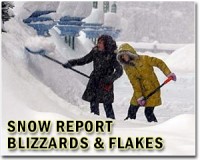| . |  |
. |
Ofunato, Japan (AFP) March 17, 2011 Thick snow covered the wreckage littering quake-hit Japan on Thursday, all but extinguishing hopes of finding anyone alive in the debris and deepening danger and misery for survivors. A cold snap brought heavy blizzards over the country's northeast overnight, covering the tsunami-razed region in deep snow and vital highways in treacherous black ice. Half a million evacuees struggled to stay warm as rescuers said their efforts to help the devastated population were at risk, almost a week after the 9.0 magnitude quake and massive tsunami hit. "We are concerned about ice on the roads," US rescuer Dave Stone told AFP in the shattered town of Ofunato. "The other thing we are worried about is the weight of snow on a building that has been compromised." Already labouring under sweeping power, gas and water shortages and with limited communication with the outside world, the devastated northeast now faces the possibility of being cut off from key supply links by the weather. Visibility had dropped considerably and some rescue teams were pulling back Thursday, fearing they would be unable to get back to their bases because of the snow and ice. The United Nations said the snow, rain and "extraordinarily cold weather" had deepened the nation's emergency and were complicating relief efforts that were already hampered by aftershocks. "Concerns are for those who have still not been reached by rescue workers as well as half a million people now living in evacuation centres," the UN said. "Many do not have protective clothing or blankets and heating is insufficient. The cold weather is expected to last until the end of the week." The government was forced to release extra fuel to cope with demand, and warned there could be widespread blackouts if people did not conserve energy after the icy conditions led to a spike in consumption. There were fears for children and the elderly, especially those sleeping on the floors of schools and gymnasiums acting as evacuation centres, where colds and influenza would rapidly spread. "We're already seeing families huddling around gas fires for warmth. In these sorts of temperatures, young children are vulnerable to chest infections and flu," said Save the Children's Steve McDonald, estimating that the disaster had left 100,000 children homeless. "Babies are especially vulnerable, as their bodies are smaller and take less time to drop below normal body temperature when exposed to cold weather." Most of the region's pharmacies were swept away, adding to the pressure on hospitals, where thousands of people were already turning up seeking to have routine prescriptions filled. Moriwaki Morisada, head of Inawashiro Hospital in Kesennuma, said 36 mostly elderly patients -- half of them bed-ridden -- were still at a nearby elementary school, where they were evacuated as the tsunami rushed forth. "We can go back (to the hospital) if electricity comes. Lives can't be protected if facilities like us have no priority," Morisada said. "This cold is worsening patients' conditions. I'll keep them alive until they can be transferred." Nearly 15,000 people were left dead or missing by the initial disaster, according to official figures, with many bodies expected to be found. More than 80,000 buildings were damaged and almost 5,000 destroyed. The Red Cross said many people were now arriving at hospitals suffering from hypothermia and at risk of pneumonia. The UN's Office for the Co-ordination of Humanitarian Affairs (OCHA) said search and rescue teams were reporting "increasingly difficult conditions" due to the weather and a lack of vehicles and fuel supplies. "Rescue teams have described it as the biggest job they have ever experienced," OCHA said.
Share This Article With Planet Earth
Related Links It's A White Out at TerraDaily.com
 Heavy snowfall halts daily life in Turkey
Heavy snowfall halts daily life in TurkeyAnkara (AFP) March 9, 2011 A cold wave that hit Turkey Wednesday brought heavy snowfalls that paralysed traffic and shut schools in the capital and disrupted road and air travel in other cities. Ankara was buried in 50 centimetres (20 inches) of snow which fell for a second day, snarling traffic despite a major clearance operation. Schools were closed and residents had difficulty making the journey to work with ro ... read more |
|
| The content herein, unless otherwise known to be public domain, are Copyright 1995-2010 - SpaceDaily. AFP and UPI Wire Stories are copyright Agence France-Presse and United Press International. ESA Portal Reports are copyright European Space Agency. All NASA sourced material is public domain. Additional copyrights may apply in whole or part to other bona fide parties. Advertising does not imply endorsement,agreement or approval of any opinions, statements or information provided by SpaceDaily on any Web page published or hosted by SpaceDaily. Privacy Statement |